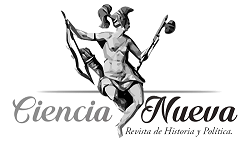Ethical commitment
ETHICAL AGREEMENT
International Journal of Political Thought follows the guidelines set by EASE (European Association of Science Editors) and COPE (Committee on Publications Ethics) that state a series of good practises for management, edition, review and publishing of the results of scientific research in journals of different areas of knowledge. In this sense:
Regarding authors. Authors must agree to sending original and unpublished works, this is, not previously published or being reviewed for publishing in other scientific journals. They will deliver a work signed with their identities and another that omits said identities and any other detail that can make reviewers learn who is the author of the work. They will accept the guidelines regarding the submission of original works for authors of the journal, as they are stated in the journal’s website and in every issue of the journal, as well as those for the process of reviewing, revision and publishing.
Regarding reviewers. Reviewers must agree to carry out a serious and responsible examination of the works, fulfilling every point in their expert reports, to be arbitered by the journal’s Board, avoiding any conflicting interests.
Regarding the Board of Redaction and Programming. The Board of Redaction agrees to select reviewers competent in the subject that is being evaluated, and to respect the confidentiality of the submitted works, their authors and other reviewers, so that anonymity is guaranteed throughout the whole reviewing process. They will also avoid reviewing, editing and publishing beyond the period established by the journal’s guidelines.
LICENSES
Free open access is guaranteed for anyone to all the content of every published issue of the journal, without costs, being allowed to print and send every article, with the only condition of stating its source and authorship.
The journal: a) does not demand authors to pay any fee for the submission and reception of their articles; b) guarantees that the authors will retain copyright without restrictions; c) allows the authors to preserve all the publishing rights without any restrictions.
Bajo Guadalquivir y Mundos Atlánticos releases its content under a "Attribution-NonCommercial-NoDerivatives 4.0 International (CC BY-NC-ND 4.0)" Creative Commons License that can be found in this url:
https://creativecommons.org/licenses/by-nc-nd/4.0/legalcode
All included articles are the original work of their respective authors. This journal is provided freely and without any cost to every member of the scientific community, operating under an Attribution-NonCommercial-NoDerivatives 4.0 International Creative Commons License.
- You canaccess every issue of the journal and its content through the journal’s official website. You can freely share and distribute this content, and use it for any work, thesis or article, as long as you specifically cite the source and original author, the issue of the journal where the article belongs, and credit the Laboratorio de Ideas y Prácticas Políticas as owner of the journal.
- You cannotclaim ownership over this content, modify it nor employ it for any commercial or lucrative ends. You cannot transform in any way the content provided by the journal and its website.
For more information, you can access the full license here:https: ://creativecommons.org/licenses/by-nc-nd/4.0/legalcode
REGULATIONS ON THE USE OF ARTIFICIAL INTELLIGENCE TOOLS
This policy sets rules for the use of AI in the creation, review, and publication of scientific articles, ensuring transparency, integrity, and respect for intellectual property rights. The journal may request additional details on the use of AI and reject manuscripts that do not comply with these guidelines.
Use of AI in writing
Authors must indicate if AI was used in writing, editing, translation, or data analysis. If generative AI models were employed, they must mention it in the acknowledgments or methodology and cite the tool used.
Responsibility and authorship
AI cannot be the author of a manuscript. Responsibility for the content lies with the human authors, who must avoid plagiarism and ensure originality.
Peer review
Reviewers may use AI for analysis, but the final decision must be human. They must inform the editors about the use of AI.
Use of AI by the editorial team
The editorial team may use AI for administrative and editorial tasks, but always under human supervision.
Ethical considerations
The use of AI must respect privacy, accuracy, and intellectual property rights, and must not be used to falsify scientific data.




